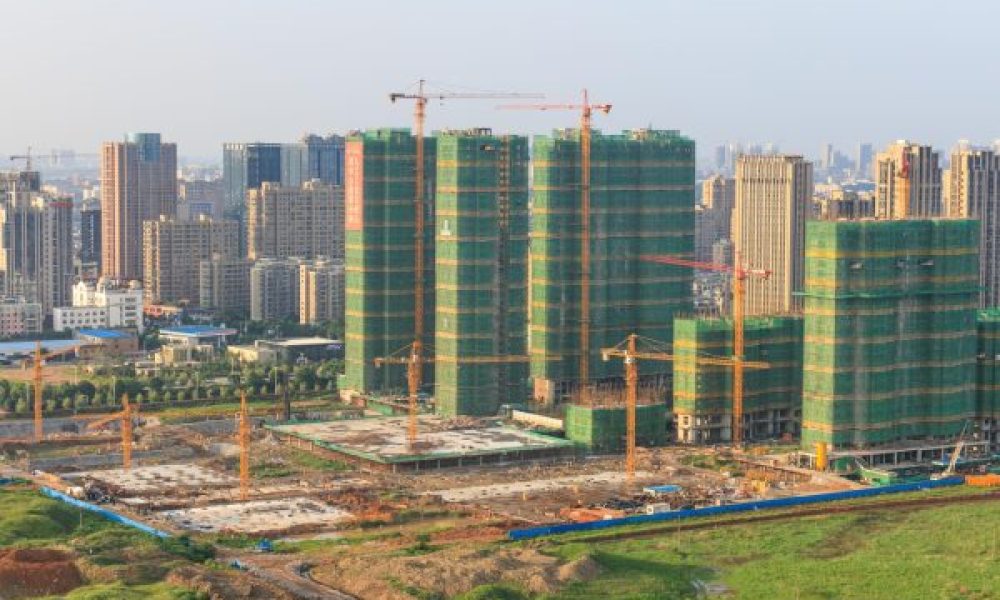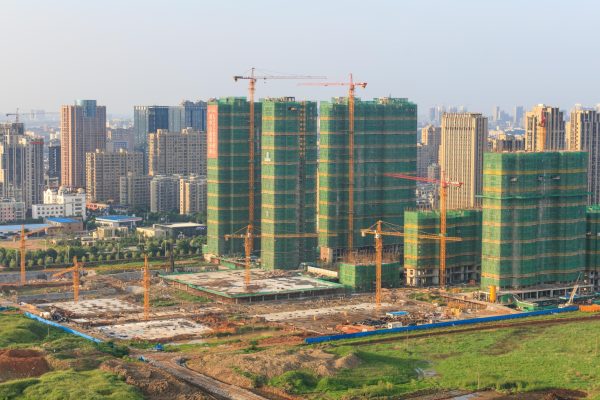Where have all the property developers gone?
Artificial islands combing tourism theme parks and residential facilities built by the Evergrande group.
Evergrande owes retail investors, suppliers and other creditors more than $300bn and narrowly averted a formal default last week. Over the past year, the group’s Hong Kong-traded shares have fallen more than 80%. Even if the embattled developer manages to meet its next debt repayment on November 11 and head off another potentially disastrous default, analysts at the credit rating agency S&P warned that many other property companies could be heading towards bankruptcy.
When will they ever learn?

China’s building boom has often resulted in empty tower blocks.
Founded by Xu Jiayin in 1996, Evergrande grew like crazy on the back of China’s liberalised residential property market, borrowing heavily from banks and issuing junk bonds to get developments off the ground—while taking deposits on homes that were little more than lines on an architect’s drawing board. It has 1,300 developments, many little more than ghost cities. It also went on a gigantic diversification spree, expanding into everything from fizzy drinks and video streaming to wealth management, according to The Week, September 25.
China has suffered housing market downturns before but this one is set to be “unusually intense”, S&P said in The Guardian on October 28.
Red lines from the red leader
Evergrande has been the most prominent casualty of a Chinese government drive to reduce debt levels and rein in soaring property prices — an important objective of Xi’s recent policy drive to reduce social inequity and promote “common prosperity” as he prepares to begin a third term in power next year, as the FT reported last week.
When news of Evergrande’s likely default broke back in September, stock markets around the world fell sharply, with a knock-on impact on commodity prices and cryptocurrencies over concerns that a cash crunch at Evergrande could spark “a full-blown financial crisis” said DealBook in The New York Times. “Worries that Evergrande’s collapse could prompt a Lehman Brothers-style collapse led to a panicked exodus from other Chinese property groups, and from banks with high exposure to the market.”
$5 trillion of debt
The Chinese property sector as a whole owes an estimated $5 trillion, according to analysts at Nomura. That is one-third of the country’s entire GDP and roughly equivalent to the whole output of the Japanese economy, the world’s third largest.
Writing in the same paper, George Magnus, a research associate at Oxford University’s China Centre and at SOAS, said China’s real estate market has been called the most important sector in the world economy. Valued at about $55tn, it is now twice the size of its US equivalent, and four times larger than China’s GDP. Taking into account construction and other property-related goods and services, annual housing activity accounts for about 29% of China’s GDP, far above the 10%-20% typical of most developed nations.
Fannie Mae and Freddie Mac lesson
The financial contagion sweeping through the sector represents a serious risk for China—and the global economy—as its investment and construction driven model of growth begins to creak under the strain of mind-boggling debts.
Those of us who remember the Great Recession of 2008 know the stock market collapsed because borrowers were defaulting on subprime mortgages in droves. The oddly named Fannie Mae and Freddie Mac made US government sponsored home loans, called “subprime”, accessible to borrowers who had low credit scores. They took out mortgages that started off with low monthly payments that increased hugely after a few years. Financial firms on-sold the bulked-up mortgages to large commercial investors. Sounds absurd now, doesn’t it?
Boom or bust?
What is your view? Will Evergrande re-finance itself, will China’s ageing population continue to buy property at the same rate? If, as some forecasters predict, China’s growth slows to 3%, will it stop hoovering up the world’s raw materials, leading to commodity price crashes? Are we heading for another global financial crash?
However you read the runes, one thing is certain: running a business is going to become more demanding, calling for better inventories, as just in time leads to empty Christmas shelves! More accurate forecasts, however, will mean improved cost controls, so there will be some jam today as well as tomorrow.
